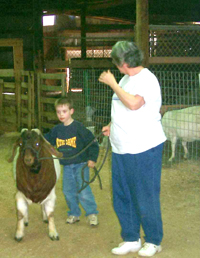Meat Goat Industry Continues To Grow in Kentucky
Meat Goat Industry Continues To Grow in Kentucky

In the past few years, the goat industry in Kentucky has seen tremendous growth, primarily in meat goats.
One of those making the move into this new enterprise is Wade Buntin of Marion, Ky., who decided to try his hand in the goat industry after years of operating a dairy.
“It got to the place in the dairy business where we were just trading dollars,” he said. “So, we had this 300-acre farm and we got interested in goats.”
Initially, the Buntins began a successful purebred Boer goat business in 1999 at their farm in Crittenden County. Recently, they have been changing their emphasis to producing meat goats for market rather than selling just breeding stock. They use their bucks (Billies) on high-percentage Boer does (Nannies) with some Spanish-breed influence. As with most crossbreeding programs within any species of farm animals, some hybrid vigor is evident in the product from these crosses.
“That’s the market,” said Buntin, vice president of the Kentucky Meat Goat Association. “I think that’s where the money is. Right now, I think they are the best form of livestock you can have on the farm in terms of money. In three and a half to four months, you can have a kid market size and sell him for $1 or $1.25 per pound and that’s pretty good money.”
In Kentucky there are at least 70,000 goats and 2,500 producers in the state with the average flock about 26 goats, based on U.S. Department of Agriculture drought payment data for 2002, said Lee Meyer, a University of Kentucky livestock marketing specialist.
Graded sales for market goats began in Marion in December 2002, through Buntin’s efforts on behalf of the West Kentucky Goat Association. Support came from the local Kentuckiana Livestock Marketing Association, the local Cooperative Extension Service, and the Kentucky Department of Agriculture. The March 2003 Graded Goat Sale had nearly 300 head sell from several surrounding counties.
In 2001, goats slaughtered in the U.S. at federally inspected facilities numbered 560,000, Meyer said. But that number only accounts for part of the U.S. meat goat industry.
“What we really know is that the slaughter is going up,” Meyer said. “But the U.S. Department of Agriculture numbers don’t include custom processors that are not federally inspected, nor on-farm slaughter. Estimates are that the non-federally inspected slaughter and imports make up about half of the total U.S. goat industry.”
U.S. and Kentucky production is increasing rapidly and the trend is expected to continue. Demand for goat meat has increased as the country’s population as diversified, Meyer said. Much of the demand is based on ethnic and religious markets.
“One of the things when you focus on religious based markets, there is more continuity,” Meyer said. “While with ethnic foods, as you go to the second and third generation, there is less likelihood of eating traditional foods.”
Goat meat, called chevon, is also a popular barbecue, and Buntin said as more consumers try goat meat he expects demand will expand into additional market opportunities. Also, he is a big supporter or 4-H programs and serves as the adult leader of the Crittenden County Goat Getters 4-H Club.
Buntin, who hosted a group of Extension agents on his farm recently, said the University of Kentucky College of Agriculture’s research and education programs are helpful to the emerging goat industry.
Meyer and Terry Hutchens, UK Extension associate for goats, have compiled three budgets for goat production based on intensity of production. This information is available through local county Extension offices.
Goats can be a good enterprise for farmers with small acres who might be looking for an enterprise to add to their operations as tobacco acreage declines, Buntin said. While it won’t replace tobacco income, it is an enterprise that has a ready market.
“There’s some place they can go every week with their goats,” he said.
